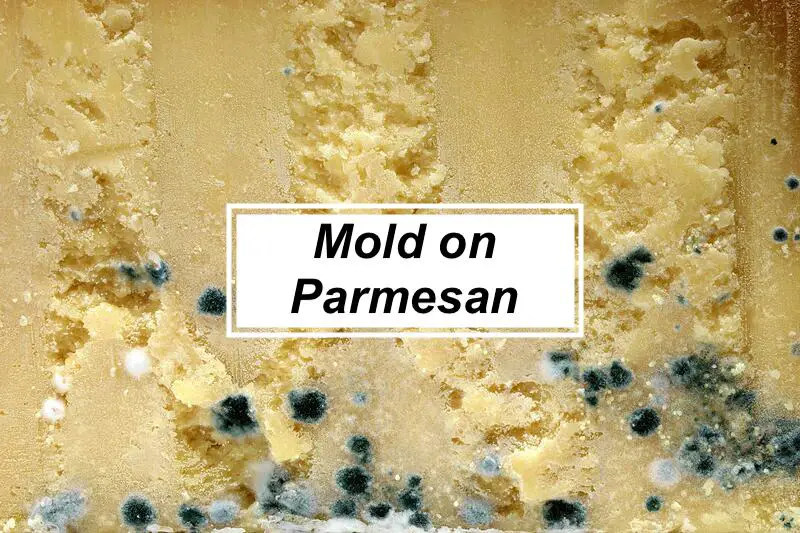Last Updated on March 22, 2024 by Aaron
Parmesan cheese is a type of hard Italian cheese that is made from cow’s milk. It has a nutty, salty flavor and is often used in pasta dishes, salads, and soups.
Parmesan cheese is a popular condiment, but did you know that it can go bad?
In this blog post, we will discuss the signs of spoilage and how to tell if Parmesan cheese has gone bad. We will also explore why Parmesan cheese sometimes makes people sick and how long it lasts after opening.
Stay safe and enjoy your next bowl of spaghetti with extra Parmesan!
Table of Contents
Can Parmesan Cheese Go Bad?
Parmesan cheese is a hard cheese that has a good shelf life. The real parmesan has been aged for a minimum of 12 months. However, like all cheeses, it can eventually go bad if it is not stored properly.
The signs of spoilage in Parmesan cheese are similar to those in other types of cheese. The signs of spoilage include an off odor, mold, and a slimy texture.
However, if you are not sure if the cheese is bad, you can do a smell test. If the cheese smells sour or ammonia-like, it is best to discard it.
The smell of bad Parmesan cheese is pungent and sharp. It is important to note that a little bit of sharpness is normal for Parmesan cheese. However, if the smell is overwhelming, it is a sign that the cheese has gone bad.
If you see mold on Parmesan cheese, you can cut away 1-inch around the moldy area and check if the rest of the cheese is safe to eat. Mold can’t penetrate far in the hard-aged cheese like parmesan, therefore it is safe to eat the cheese if there is only a little bit of mold.
Mold on parmesan may look like this:

If the Parmesan cheese has a slimy texture, it is most likely past its prime and not appetizing. The fat content is separated as the moisture dried out, the parmesan may appear dry and oily.
Also, the cheese should also be a uniform color. If there are any brown or green patches, it is an indication that the Parmesan cheese has gone bad.
Can you get sick from expired Parmesan cheese?
Yes, you can get sick from eating expired Parmesan cheese. The symptoms of food poisoning include nausea, vomiting, and diarrhea. If you are experiencing any symptoms after eating Parmesan cheese, it is best to speak with your doctor.
This is because sometimes expired cheese can contain harmful bacteria that can make you sick.
Why does Parmesan cheese make me sick?
Sometimes people feel sick after eating Parmesan cheese.
This is because Parmesan cheese contains a low amount of lactose – about 0 to 5 grams per 100g serving of parmesan. Certain brands may have no detectable lactose (as in carbohydrate), for example, the Reggano grated parmesan by Aldi nutrition contains 0 lactose, while Schnucks Parmesan nutrition contains about 7 grams of lactose in the same serving.
Another possibility is the high sodium content in parmesan. A 1-ounce serving of Kraft parmesan contains about 450 mg of sodium, that’s over 20% of the daily intake limit! Overconsuming can cause dizziness, stomach cramp, and nausea.
So, how long does Parmesan cheese last?
Parmesan cheese wedge will last for six to eight weeks after opening if it is stored properly in the fridge. The unopened package can last about two to four months.
If you want it to last even longer, you can freeze it. Read how.
A wheel of parmesan usually lasts for about two to four months if it is stored in a cool, dry place. If it is refrigerated, it will last for about 10 months or above. Once opened, it’s safe to eat for six weeks.
Opened Grated Parmesan cheese will last in the fridge for about 1-2 months, or 3-7 days after its use-by date for unopened. Unopened parmesan sold without refrigeration can last for 10 months or longer.
Can parmesan be left out or stored at room temperature?
Soft cheese like cream cheese has 2-hour rules. While for harder cheese like Parmesan cheese, it should not be left out at room temperature for more than 8 to 12 hours. If it is left out for longer, bacteria can start to grow and the cheese will spoil.
Parmigiano Reggiano, or real parmesan, can be stored at room temperature for a few days if it is unopened in an airtight package.
If you have already opened the package, it is best to store it in the fridge.
How to store Parmesan cheese?
Parmesan cheese should be stored in the fridge, in its original package, wrapped in plastic, or placed in an airtight container.
It is best to consume it within two to four weeks after opening.
When is Parmesan too old? Parmesan is an aged cheese. The cheese block or wedge does not have a use-by date like the grated. However, it will start to spoil after a certain amount of time or if stored unproperly.
Look for the signs of spoilage.
Reference:

